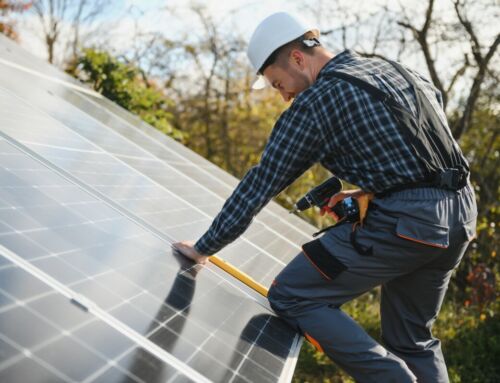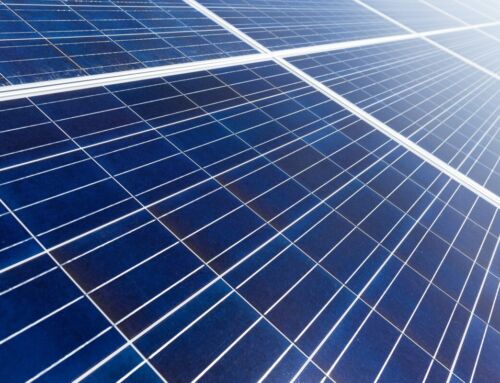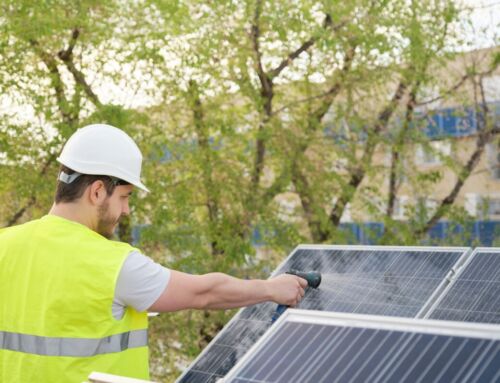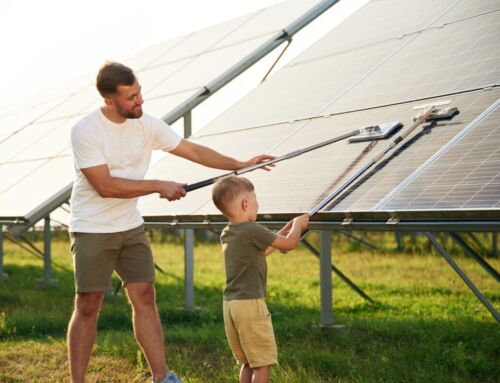Solar panels are a marvel of modern technology, converting sunlight into electricity to power our homes and businesses. But how exactly do they work with UV light? Understanding this process is crucial for anyone considering solar energy. While solar panels primarily use visible light, they also harness ultraviolet (UV) light to some extent. This is because solar panels are designed to capture a broad spectrum of sunlight, including UV rays, which contribute to the overall energy production. However, UV light is not the primary source of energy for solar panels, as they are most efficient at converting visible light into electricity.
How Solar Panels Utilize Different Light Spectrums
-
Visible Light: The main driver of solar panel efficiency, visible light is the most effectively converted into electricity.
-
UV Light: Although not the primary source, UV light does contribute to energy production, especially on cloudy days when visible light is less abundant. – Infrared Light: This spectrum is less effective for energy conversion but still plays a role in the overall efficiency of solar panels.
-
Frequently Asked Questions About Do Solar Panels Work with UV Light? Explained
-
Do solar panels use UV light effectively?
Yes, solar panels do use UV light, but it is not their primary source of energy. They are designed to capture a wide range of sunlight, including UV rays, which helps in generating electricity even when visible light is limited.
How does UV light affect solar panel efficiency?
UV light can enhance solar panel efficiency by providing additional energy on cloudy days. However, the panels are optimized for visible light, which remains the most significant contributor to their energy output.
The Role of UV Light in Solar Energy Conversion
Solar panels are a marvel of modern technology, converting sunlight into electricity to power our homes and businesses. But a common question arises: Do solar panels use UV light? Understanding the role of UV light in solar energy conversion is crucial for anyone considering solar power. While solar panels primarily harness visible light, they also utilize a portion of the ultraviolet (UV) spectrum, enhancing their efficiency and energy output. This interplay between UV light and solar panels is a fascinating aspect of solar technology that deserves a closer look. ## The Role of UV Light in Solar Energy Conversion Solar panels are designed to capture a broad spectrum of sunlight, including visible, infrared, and ultraviolet rays.
While visible light is the primary driver of electricity generation, UV light contributes to the overall energy output. Solar cells, particularly those made from silicon, can absorb UV rays, which helps in generating additional electricity. This means that even on cloudy days, when visible light is less intense, UV rays can still penetrate clouds and contribute to energy production, ensuring a more consistent power supply.
How UV Light Enhances Solar Panel Efficiency
- UV Absorption: Solar panels absorb UV light, which adds to the energy conversion process.
- Cloudy Day Performance: UV rays penetrate clouds, allowing solar panels to generate electricity even in less sunny conditions.
- Material Efficiency: Different materials used in solar panels, like silicon, are optimized to capture a range of light wavelengths, including UV.
Frequently Asked Questions About Do Solar Panels Work with UV Light? Explained
Q: Do solar panels use UV light effectively?
A: Yes, solar panels use UV light effectively, contributing to their overall energy output. While visible light is the main source of energy, UV light enhances efficiency, especially on cloudy days.
Q: Can solar panels generate electricity on cloudy days?
A: Absolutely. Solar panels can still generate electricity on cloudy days because UV rays penetrate clouds, ensuring a steady energy supply.
Q: What materials in solar panels capture UV light?
A: Silicon, commonly used in solar panels, is effective at capturing UV light, which boosts the panels’ efficiency and energy production.
Do Solar Panels Use UV Light Naturally? Exploring the Science
Do Solar Panels Use UV Light Naturally?
Exploring the Science Harnessing the power of the sun is a remarkable feat of modern technology, and understanding how solar panels work with UV light is crucial for maximizing their efficiency. While solar panels are primarily designed to capture visible light, they also interact with ultraviolet (UV) light. This interaction is vital because UV light, though invisible to the naked eye, is a component of sunlight that can contribute to the energy generation process. But how exactly do solar panels use UV light naturally? Let’s delve into the science behind it.
The Role of UV Light in Solar Energy Solar panels are composed of photovoltaic (PV) cells, which convert sunlight into electricity.
These cells are most efficient at absorbing visible light, but they also capture a portion of UV light. Although UV light accounts for a smaller fraction of the energy produced, it can still enhance the overall efficiency of solar panels. This is because UV light can penetrate through clouds, allowing solar panels to generate electricity even on overcast days. Therefore, while not the primary source of energy, UV light plays a supportive role in solar energy production

Thinking about solar energy? See how it can lower your bills and elevate your home’s efficiency. Get Your Free Estimate at NewSolar Quotes
Enhancing Solar Panel Efficiency with UV Light
- UV Light Penetration: Unlike visible light, UV rays can penetrate through clouds, ensuring consistent energy production.
- Material Sensitivity: Some advanced solar panels are designed with materials that are more sensitive to UV light, optimizing their energy capture.
- Durability and Longevity: UV light can affect the materials of solar panels over time, so manufacturers often use UV-resistant materials to enhance durability.
Frequently Asked Questions About Do Solar Panels Work with UV Light? Explained
Do solar panels use UV light effectively?
Yes, solar panels can use UV light effectively, although it is not their primary energy source. UV light contributes to energy production, especially on cloudy days, by penetrating cloud cover. Can UV light damage solar panels?
While UV light can degrade materials over time, most solar panels are built with UV-resistant materials to withstand prolonged exposure, ensuring longevity and efficiency.
Is UV light necessary for solar panels to work?
UV light is not necessary for solar panels to function, but it can enhance their performance by providing additional energy, especially in less sunny conditions.
Maximizing Efficiency:
How UV Light Affects Solar Panel Performance Understanding how solar panels interact with UV light is crucial for maximizing their efficiency. While solar panels primarily harness visible light to generate electricity, they also utilize ultraviolet (UV) light, albeit to a lesser extent. This raises the question: do solar panels use UV light effectively? By exploring this, we can better appreciate the full spectrum of light that contributes to solar energy production.
The Role of UV Light in Solar Energy
Solar panels are designed to capture a broad range of light wavelengths, including UV light. Although UV light constitutes a small portion of the solar spectrum, it can still contribute to energy generation.
Key Points:
- UV Light Contribution: While not as efficient as visible light, UV rays can still generate electricity.
- Durability Factor: UV exposure can degrade materials over time, but modern panels are built to withstand these effects. #### Enhancing Solar Panel Efficiency To maximize solar panel efficiency, it’s essential to consider the impact of UV light.
- Strategies include: – Advanced Coatings: These can help panels absorb more UV light. – Material Innovations: New materials are being developed to better utilize UV light, enhancing overall energy output.
Frequently Asked Questions About Do Solar Panels Work with UV Light?
Q: Do solar panels use UV light effectively?
A: Yes, solar panels do use UV light, but it is less efficient compared to visible light. However, advancements in technology are improving their ability to harness UV light.
Q: How does UV light affect solar panel durability?
A: UV light can cause degradation over time, but modern solar panels are designed with materials that resist UV damage, ensuring longevity and sustained performance.
Q: Can UV light improve solar panel efficiency?
A: While UV light contributes less to energy production, innovations in solar technology are enhancing panels’ ability to utilize UV light, thereby improving overall efficiency.
Innovations in Solar Technology:
Enhancing UV Light Utilization Harnessing the power of the sun is at the forefront of renewable energy solutions, but do solar panels use UV light effectively? Understanding this can revolutionize how we perceive solar energy’s potential. While traditional solar panels primarily capture visible light, advancements in technology are now enabling them to utilize UV light more efficiently, opening new avenues for energy generation even on cloudy days.
How Do Solar Panels Use UV Light?
-
Traditional Solar Panels: These primarily convert visible light into electricity, with limited UV light absorption.
-
Advanced Technologies: Innovations like UV-sensitive coatings and materials are enhancing the ability of solar panels to harness UV light, increasing efficiency.
-
Benefits: Utilizing UV light can lead to more consistent energy production, especially in regions with variable weather conditions.
The Future of Solar Energy
As research progresses, the integration of UV light utilization in solar panels promises a more robust and reliable energy source. This not only maximizes the potential of solar panels but also contributes to a more sustainable future. By tapping into UV light, solar technology can provide energy solutions that are less dependent on direct sunlight, making solar power more accessible worldwide.
Frequently Asked Questions About Do Solar Panels Work with UV Light? Explained
Q: Do solar panels use UV light effectively?
A: Traditional solar panels have limited UV light absorption, but new technologies are enhancing their ability to utilize UV light, improving efficiency and energy output.
Q: How do advancements in solar technology impact energy production?
A: By incorporating UV-sensitive materials, solar panels can generate more energy even in less sunny conditions, ensuring a more consistent power supply.
Q: Why is UV light utilization important for solar panels?
A: Utilizing UV light allows solar panels to produce energy in a wider range of conditions, making solar power a more reliable and versatile energy source.
Solar energy is becoming an increasingly popular choice for homeowners and businesses alike, but many people wonder, “Do solar panels use UV light?” Understanding how solar panels work with UV light is crucial for anyone considering this sustainable energy source. Solar panels primarily rely on visible light to generate electricity, but they also utilize ultraviolet (UV) light, which can enhance their efficiency. This means that even on cloudy days, when visible light is less intense, solar panels can still produce energy, thanks to UV light. We are committed to supporting your solar energy journey by providing the latest insights and technologies to maximize your solar investment.
How Solar Panels Utilize UV Light
Solar panels are designed to capture a broad spectrum of sunlight, including UV rays, which are invisible to the naked eye. While visible light is the primary driver of solar energy production, UV light contributes to the overall efficiency of solar panels.
- Enhanced Energy Production: UV light can penetrate clouds, allowing solar panels to generate electricity even on overcast days.
- Durability and Performance:
- Solar panels are built to withstand UV exposure, ensuring long-term performance and reliability. By understanding the role of UV light, you can better appreciate the versatility and resilience of solar panels, making them a smart choice for sustainable energy.
Frequently Asked Questions About Do Solar Panels Work with UV Light? Explained
Do solar panels use UV light effectively?
Yes, solar panels use UV light effectively, contributing to their ability to generate electricity even in less-than-ideal weather conditions. This enhances their overall efficiency and reliability.
How does UV light affect solar panel efficiency? UV light helps maintain energy production during cloudy days, as it can penetrate cloud cover. This ensures that solar panels continue to produce electricity, albeit at a reduced rate compared to sunny days. Are solar panels designed to withstand UV exposure? Absolutely. Solar panels are engineered to endure prolonged UV exposure, ensuring they remain functional and efficient throughout their lifespan.
Environmental Impact: UV Light and Solar Panel Sustainability
Environmental Impact:
UV Light and Solar Panel Sustainability Harnessing the sun’s energy is a cornerstone of sustainable living, but how exactly do solar panels work with UV light? Understanding this interaction is crucial for maximizing efficiency and environmental benefits. Solar panels primarily convert visible sunlight into electricity, but they also utilize a portion of ultraviolet (UV) light. While UV light constitutes a smaller percentage of the solar spectrum, its role in energy conversion is significant. This knowledge helps in optimizing solar panel technology, ensuring that we harness as much solar energy as possible, thereby reducing our carbon footprint and promoting sustainability.
How Do Solar Panels Use UV Light?
- Conversion Process: Solar panels are designed to absorb a broad spectrum of sunlight, including UV rays.
Although UV light is not the primary source of energy conversion, it contributes to the overall efficiency of solar panels.
- Material Efficiency: Advances in photovoltaic technology have led to materials that better capture UV light, enhancing the panels’ performance even on cloudy days when visible light is limited. ### Frequently Asked Questions About Do Solar Panels Work with UV Light? Explained
Do solar panels use UV light effectively?
Yes, solar panels use UV light, but it is not their primary energy source. They are designed to capture a wide range of light wavelengths, including UV, to maximize energy production.
Can solar panels work on cloudy days using UV light?
Absolutely. While visible light is reduced on cloudy days, UV light can penetrate clouds, allowing solar panels to continue generating electricity, albeit at a reduced efficiency.
Understanding Solar Panels and UV Light
Solar panels are a pivotal component in the shift towards renewable energy, harnessing sunlight to generate electricity. But do solar panels use UV light? While solar panels primarily rely on visible light, they can also utilize ultraviolet (UV) light to some extent. This capability enhances their efficiency, especially on cloudy days when UV rays penetrate clouds more effectively than visible light. Understanding how solar panels interact with UV light can help optimize their placement and usage, ensuring maximum energy production even in less-than-ideal weather conditions.
How Solar Panels Utilize UV Light
Solar panels are designed to convert sunlight into electricity through photovoltaic cells. These cells are sensitive to a range of light wavelengths, including UV light. Although UV light comprises a small portion of the solar spectrum, it contributes to the overall energy output of solar panels. This means that even when the sun isn’t shining brightly, panels can still generate power, thanks to their ability to capture UV rays.
This adaptability makes solar panels a reliable energy source in various climates, enhancing their appeal to environmentally conscious consumers.
Frequently Asked Questions About Do Solar Panels Work with UV Light? Explained
Q: Do solar panels use UV light to generate electricity?
A: Yes, solar panels can use UV light to generate electricity. While they primarily rely on visible light, UV light also contributes to their energy output, making them effective even on cloudy days.
Q: How efficient are solar panels with UV light?
A: Solar panels are not as efficient with UV light as they are with visible light, but they still benefit from it. The ability to harness UV rays ensures some level of energy production in less sunny conditions.
Q: Can solar panels work without direct sunlight?
A: Yes, solar panels can work without direct sunlight. They can capture diffuse light, including UV rays, which allows them to generate electricity even on overcast days.
Switch to solar and start saving now! Don’t miss out on a cleaner, cost-effective energy solution. Schedule Your Free Consultation at NewSolar Quotes
Discover more ways to save with solar! Visit New Solar Quote and see the potential for your home.





